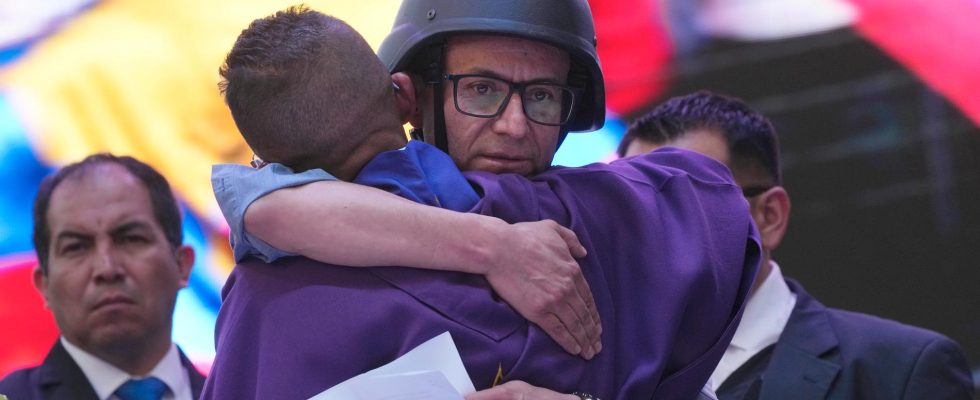1 / 3Photo: Dolores Ochoa/AP/TT
Party leaders with bulletproof vests, suspicions of contract killings and a society in the violence of the drug cartels.
The situation is tense when Ecuador goes to elections – after several politicians have been murdered.
Crime and punishment were in focus right from the start of the election campaign.
But after the assassination of presidential candidate Fernando Villavicencio in the capital Quito on August 9, the issue has become urgent. Villavicencio waged an unprecedented campaign against corruption and organized crime.
Just days before the murder, he stated that he had been threatened by the leader of the notorious Los Choneros gang.
Dramatic killing spree
In recent years, Ecuador has become a hub for the global cocaine trade, which is currently booming as demand from Europe and North America has risen following the pandemic. Foreign drug cartels have joined forces with indigenous Ecuadorian gangs in pursuit of control over exports. It has unleashed a wave of brutal violence.
The murder rate in the country has more than quadrupled since 2018. On Monday, another politician was shot dead in the province of Esmeraldas – the third politician murdered in the space of a month.
Villavicencio, who was also a combative journalist, was behind a corruption exposé that led to the 2020 prison sentence of former president Rafael Correa. It has forced Correa, in exile in Belgium, to deny that he was involved in the murder.
Most, however, point their suspicions at organized crime.
Hard too candidate sprints
The election spurt has been marked by new promises to crack down on the cartels. Villavicencio’s replacement, fellow journalist Christian Zurita, has been wearing a bulletproof vest during his press conferences. So did presidential candidate Daniel Noboa during the last televised debate.
At the same time, the fear of violence has caused ex-military Jan Topic’s popularity to increase. Topic has vowed to crush the gangs with draconian methods similar to those used in El Salvador, where a state of emergency prevails.
However, Luisa González, a lawyer with close ties to former leftist President Correa, has maintained her lead in opinion polls. Among the other candidates are economist and former vice president Otto Sonnenholzner, as well as environmental activist Yaku Pérez.
The latter has also campaigned for the yes side in two referendums held in parallel with the presidential election to stop oil drilling in an area of the Amazon and to stop a mining project in the Chocó Andino nature reserve.
THE FACTS The candidates
Luisa González: A 45-year-old lawyer with close ties to former left-wing president Rafael Correa, who was in power from 2007-2017. Vows to continue in Correa’s footsteps, as well as to fight the drug cartels’ grip on the country.
Christian Zurita: 53-year-old journalist who was named the presidential candidate of the “Movimiento Construye” just four days before the election, as a replacement for the murdered journalist colleague and friend Fernando Villavicencio. Has continued Villavicencio’s fearless campaign against the drug cartels, and is among other things behind his promise to take military control of the ports used for drug exports.
Jan Topic: 40-year-old businessman and former paratrooper and sniper. Believed to be the candidate who gained the most in popularity after the assassination of Villavicencio. Vows to crush the gangs with methods similar to those used by El Salvador’s authoritarian president Nayib Bukele.
Yaku Pérez: 54-year-old left-wing politician, indigenous and environmental activist. Trained lawyer who has written several academic works on, among other things, environmental protection. Highlights the widespread poverty and lack of education as an important cause of crime in the country.
Otto Sonnenholzner: 40-year-old economist and businessman, as well as former vice president 2018-2020 under Lenín Moreno’s rule. Describes himself as a pragmatic politician with the election motto “peace, money and progress”.
Source: AFP
Read more
